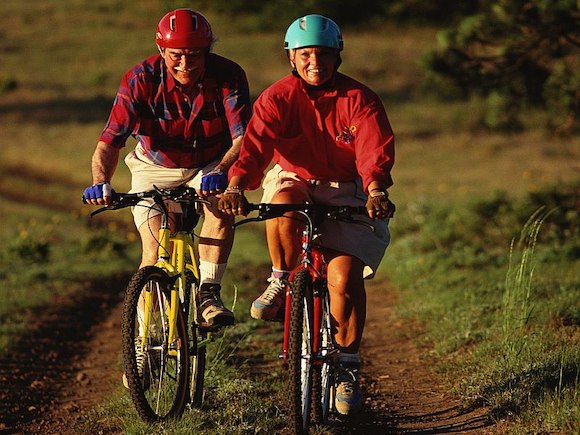
25 Jun Live Longer: Exercise More, Age Less
This summer, the Telluride Ski Resort and The Peaks Resort & Spa in Mountain Village are hosting a series of week-long wellness intensives under the banner of Live Longer Retreat. The Big Idea is to support your (recurring) New Year’s resolution to get really healthy and therefore live longer – and well. Half the year is in the rear view mirror. What progress have you made?
With an evidence-based, scientific approach to health and longevity and featuring an experienced staff of medical professionals, personal trainers, Pilates and yoga instructors, dietitians, and chefs, all focused on your unique wellness profile, each Live Longer Retreat is one-of-kind in the U.S. .
The intensives, which are limited to only 10 – 15 participants, include personal consultations, hiking, spinning, yoga, Pilates, talks and demonstrations related to nutrition, cooking classes, and more.
Dates this summer/fall season are July 15 – July 21; August 19 – August 25; and September 27 – September 30.
The program is led by Dr. Alan Safdi, a world-renowned internist and gastroenterologist with encyclopedic knowledge of mind-body wellness and preventative medicine. Dr. Safdi also has a gift for delivering evidence-based medical findings for healthier living in easily digestible sound bytes.
In the run-up to the retreats, Dr. Safdi is posting regular updates on Telluride Inside… and Out based on the latest, closely vetted research about subjects in the field of health, wellness and longevity.
This week, Dr. Safdi touts a study that states you can take 10 years off your chronological age simply by exercising more.
Go here for more hard evidence on the subject.
Feel free to sign up now to participate in a Live Longer Retreat – or call 1-877-448-5416 for further information.

We’ve known for a long time that exercise is healthy. However, a long-term study conducted by sports scientists at the Karlsruhe Institute of Technology (KIT) found that people who lead active lifestyles are around 10 years younger in terms of motor skills alone.
STUDY INVOLVING 500 PARTICIPANTS:
The German study began in 1992 and included 500 volunteers between the ages of 35 and 80. Participants regularly underwent a series of medical examinations (measuring height, weight, body composition, EKG and lung function). In addition, they had to perform fitness and motor skill tests — including sit-ups, one-leg stands and push-ups.
10 YEARS YOUNGER AND FEWER HEALTH PROBLEMS:
The result: people of an advanced age who exercise regularly are around 10 years younger in terms of motor skills than those who lead a sedentary lifestyle. The KIT study says, for instance, that a 50-year-old who exercises regularly is as fit as an inactive 40-year-old. Active people also tend to have fewer physical complaints with advancing age. In fact, those who do less than 2.5 hours of moderate physical activity per week, as recommended by the World Health Organization or WHO, are four times more likely to suffer from Type 2 diabetes.
IN SUM, WE CAN SAY THAT…
• Fitness and motor skills decline with age. Exercise, however, can slow the process down significantly.
• More exercise also means enhanced quality of life in old age.
• Active people are 10 years younger than sedentary people in terms of motor skills alone.
And to add more fuel to your fire to ramp up your exercise program, read this article by Amanda Macmillan published last year in Time magazine.
The more exercise people get, the less their cells appear to age. In a new study in Preventive Medicine, people who exercised the most had biological aging markers that appeared nine years younger than those who were sedentary.
Researchers looked at the telomeres from nearly 6,000 adults enrolled in a multi-year survey run by the Centers for Disease Control and Prevention. People were asked what physical activities they had done in the past month and how vigorously they did them. They also provided DNA samples, from which the researchers measured telomere length. Telomeres, the protein caps on the ends of human chromosomes, are markers of aging and overall health. Every time a cell replicates, a tiny bit of telomere is lost, so they get shorter with age. But they shrink faster in some people than in others, explains study author Larry Tucker, professor of exercise science at Brigham Young University.
“We know that, in general, people with shorter telomeres die sooner and are more likely to develop many of our chronic diseases,” says Tucker. “It’s not perfect, but it’s a very good index of biological aging.
After adjusting for smoking, obesity, alcohol use, gender, race and other factors, Tucker found in his study that people who exercised the most had significantly longer telomeres than those who were sedentary. The most sedentary people had 140 fewer base pairs of DNA at the ends of their telomeres, compared to the most active: a difference of about nine years of cellular aging, he says…


Sorry, the comment form is closed at this time.